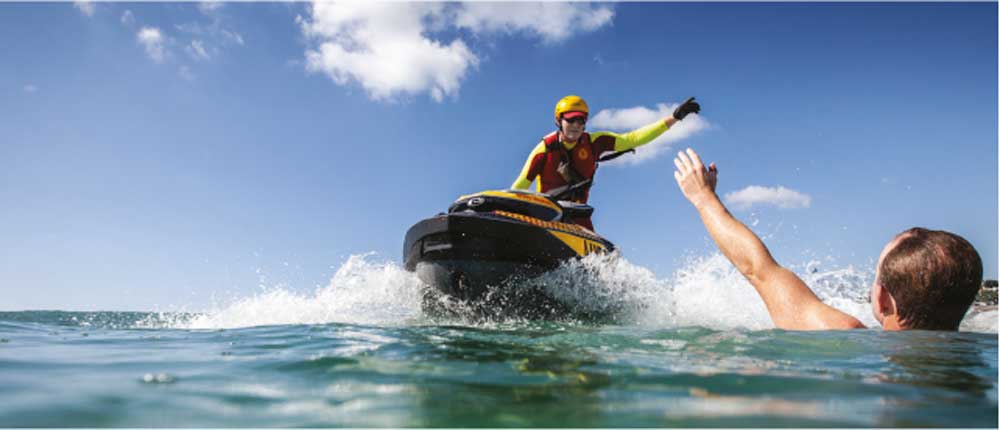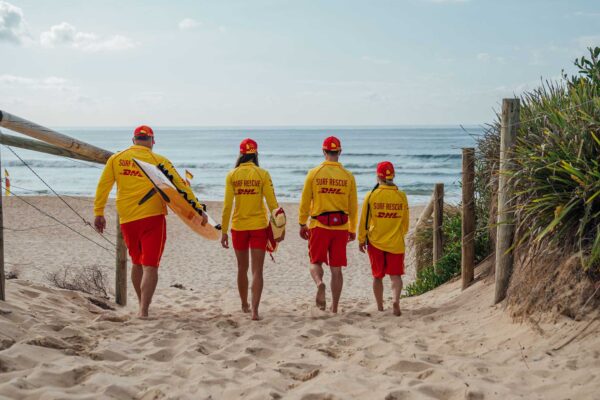DHL Express’ partner Surf Life Saving Australia (SLSA) has recently launched new research that highlights a spike in drowning deaths in the past 12 months, with unfamiliar locations, exhaustion, and interruptions to regular swimming during the COVID-19 pandemic considered key factors.
In the Surf Life Saving National Coastal Safety Report 2021 released Wednesday, 8 September, there were 294 drowning deaths in the past 12 months across Australia’s coastline, inland waterways and pools, which is 20% higher than last year (245).
Two key trends emerged – spikes in drowning deaths immediately following large-scale lockdowns, and more Australians holidaying domestically and swimming in unfamiliar (and often unpatrolled) locations. Alarmingly men were once again overrepresented in the drowning statistics, accounting for 80%, with alcohol and drugs, risk taking behaviour and over-estimating their ability considered key factors.
While further research is needed, the findings from show that the impacts of COVID on increases in drowning deaths is largely attributable to:
1. Increased drowning risk among Australians visiting unfamiliar locations. COVID has seen more people seeking out remote places to escape crowds, swimming outside of patrolled hours, taking more day trips to isolated beaches, rivers or lakes and holidaying domestically at unfamiliar locations
2. Increased drowning risk around the home. Complacency can often seep in when people are exhausted from working from home, homeschooling, and restricted time in confined spaces, sometimes resulting in distractions or unsupervised children around water
3. Australians lack the swimming skills necessary to enjoy the water safely. COVID has seen children missing out on swimming lessons, adults and teenagers with reduced pool access who are no longer swim fit and/or lack confidence in the water leading to increased drowning incidents in open waterways

With more Australians holidaying at home and visits to coastal areas and inland waterways increasing, water safety experts are pleading for people to not be complacent when on, in and around water.
The last 18 months have been tough on all Australians and while enjoying Australia’s coastline is a favourite pastime, it is no time to be complacent.
Adam Weir, CEO, Surf Life Saving Australia
“With more Australians holidaying at home and making the most of our iconic coastline, our simple message is to swim at patrolled locations and be aware of your actions and decisions around the water, know your limits. We want to ensure everyone can enjoy our coastline safely and return home to loved ones,” Mr Weir said.
“With 136 coastal drowning deaths in the past 12 months, sitting above the 10 year average, we are deeply concerned to once again see that men accounted for 90% of those drowning deaths.
“Visiting and exploring new places we know is going to be high on people’s list when coming out of lockdown. But be sure to seek out patrolled beaches, download Surf Life Saving’s Beachsafe App and when boating, using watercraft or rock fishing, always wear a lifejacket – it could save your life,” he concluded.
NATIONAL Key findings – Surf Life Saving National Coastal Safety Report 2021

SLSA work alongside Royal Life Saving Society – Australia (RLSSA) to develop this report as key leading peak authorities for water safety.
DHL Express and SLSA will continue to organise regular programs and initiatives to increase coastal safety and environment-protection awareness into the summer months.
To view the full Surf Life Saving National Coastal Safety Report 2021, visit here.




